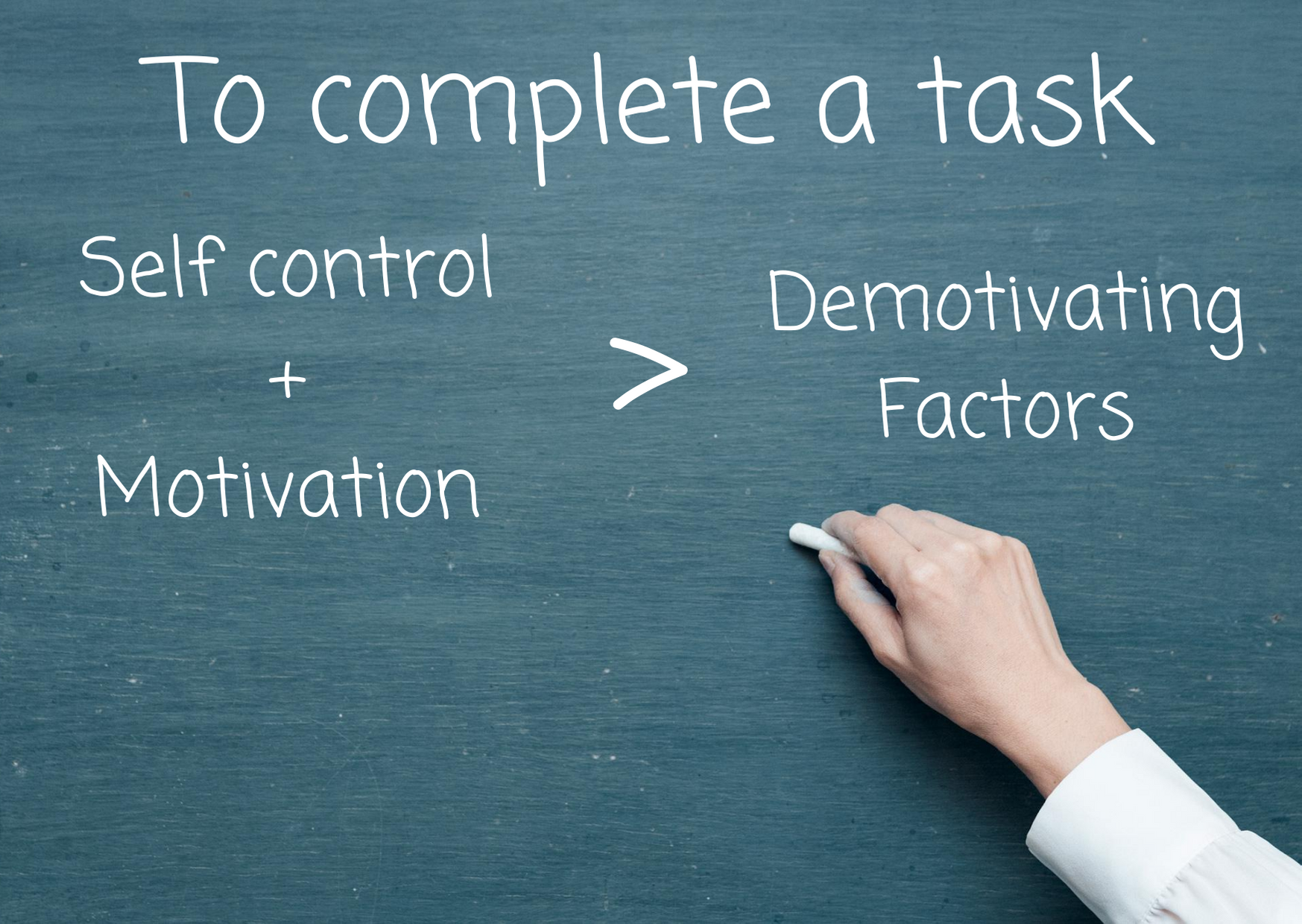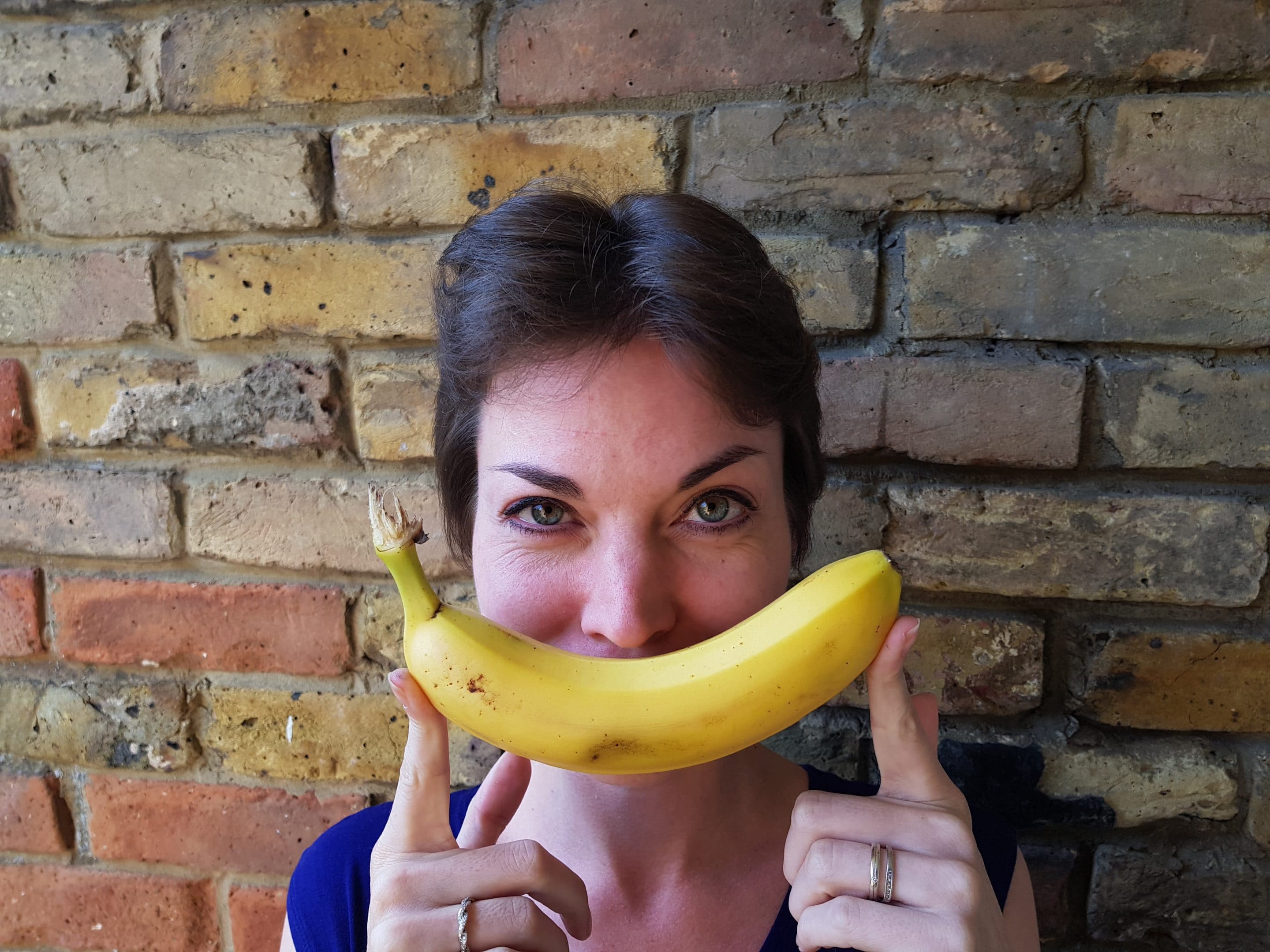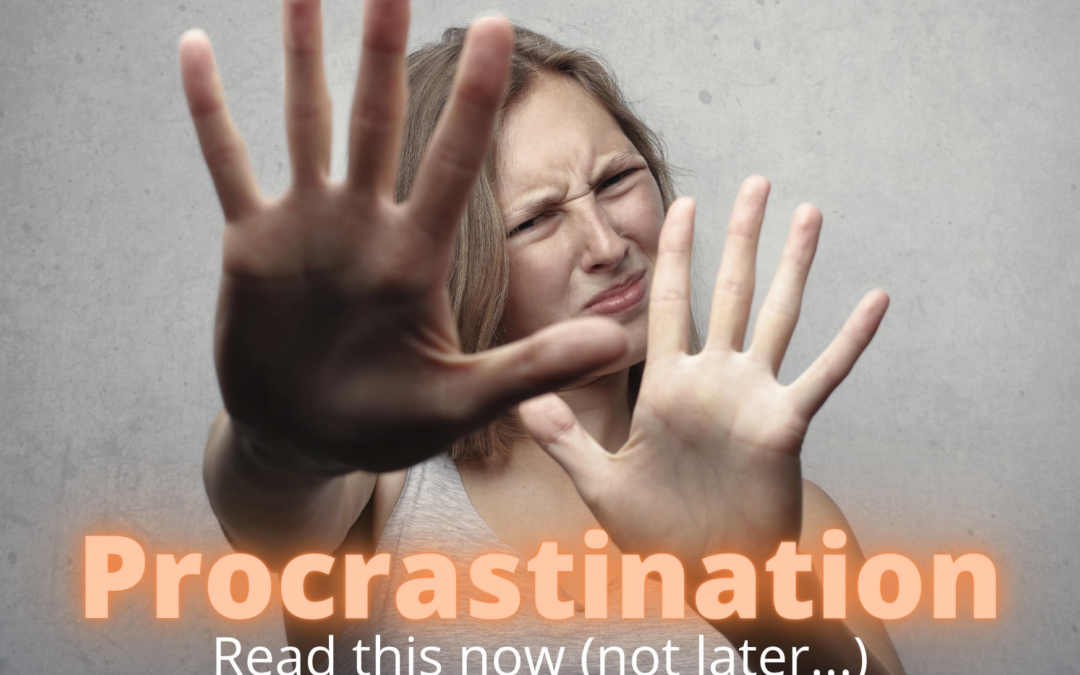Procrastination
Ah procrastination, the destroyer of so many good ideas and intentions. It affects us all, causing us to put off doing things we know we should do, and even want to do! Like not changing job, never quite getting around to learning a language, or not starting that new diet we planned to.
What is procrastination?
The definition of procrastination is ‘the action of delaying or postponing something’. Also known as putting something off. Finding something else to do instead, or coming up with a myriad of excuses as to why now is not the right time for this task.
How does this manifest? Usually, when it’s a task which needs to be done soon, we end up faffing around, fiddling with things that don’t really need doing, finding something to keep us too busy to do the real task. Surfing the internet, checking messages, heading for the snack cupboard. Anything to not complete the task right now.
It can also come across as an inability to make a decision.
So why do we procrastinate?
As with many things that impact the way we operate, it’s all in our heads. One of our brain’s ways of coping with things. It’s a conflict between the prefrontal cortex and the amygdala. The prefrontal cortex is a logical part of the brain, involved in self regulation and future planning. The amygdala is where our survival mechanism and emotional and fear processing reside. If a task is unpleasant, the amygdala will motivate us emotionally to avoid it as it wants to move us away from things that threaten us. It’s an evolutionary response to being hunted. The prefrontal cortex has grown since then and developed, and now tries to get us to continue with the task, because the rewards are worth it.
Are there benefits to procrastinating?
Procrastination can mean we take the time to actually think things through, or prepare properly. Even if we’re not aware of it, our minds can be working on the problem subconsciously so that when you do finally do it it’s easier.
If you’re procrastinating on a decision, this can be good as it stops you from jumping into a wrong decision. You can collect more information and make the right informed decision later.
It’s also a way of prioritising tasks. If done right and for the right reasons, it means we focus on the tasks that matter to us and put off the ones that don’t resonate or feel like they benefit us.
The problem comes when we procrastinate for the wrong reasons, when a task that we really should do is boring, or we hate, or when we procrastinate because of fear.
Because of the influence of the amygdala, fear is one of the most common reasons we procrastinate. It often stems from our fears of failure and the feelings of shame and potential criticism or judgement from others. These are our modern day lions.
We can fear that we will fail because we know what is required but aren’t confident that we can do it right, or are scared of the consequences, or because we don’t really know what is required and so are worried that we will do it wrong.
Other types of fear include a fear of the result, perhaps success at the task could result in a total life change, or could mean that you get ahead but a friend gets left behind. You could also fear the task itself, like a call with someone we dislike, or a conversation we know will likely end in confrontation.
All of these fears can prevent us from being able to complete tasks. Taking procrastination from putting things off for a while, to never getting around to doing them.

How do we get things done?
When we are faced with a decision or a task, we use our drive (motivation) and self-control to get it done, especially if there is a reward for our efforts. This is our prefrontal cortex at work.
So, is it just a lack of willpower which causes us to procrastinate, or is it about being intrinsically lazy? Willpower is partly to blame, but we should remember that when there is no motivation, or if the reward cannot clearly be seen or is too far after the task, our willpower will have to work overtime to see us through.
This is made worse by demotivating factors, which can reverse our motivation and give us reasons for not wanting to complete a task. This is where our fear of failure, anxiety and other negative emotions and feelings of self-doubt affect us. Where our amygdala starts to try to overpower our prefrontal cortex.
This fight against your willpower can then be further exacerbated by fatigue from a busy or difficult day.
So our motivation and self-control must exceed the effects of the demotivating factors to get something done.
It’s worth noting that fear of failure is more of an issue for people with low self-esteem and low self-confidence, unsurprisingly, as it takes self-belief to be able to move into tackling some of these things head on. Depression can also increase the chances of procrastination as you don’t have the mental energy to try and lack the motivation, which is why it can be so hard to take any positive steps needed to get out of it, even just going for a walk.

What’s wrong with procrastinating?
Other than that the task that is being procrastinated probably does need doing, and that many of the tasks we need to complete in order to be successful at life are not necessarily fun, there are other reasons why it’s not good to procrastinate.
Unfortunately, the task we’re procrastinating is often one that causes stress and anxiety because we’re worried about it. So the longer it goes undone, the more stress it has caused. And we can end up in a vicious cycle, as the anxiety from not doing it makes us more anxious about doing it and so we put it off again, increasing our anxiety about the task.
Avoiding tasks can also cause a sense of guilt and we can become frustrated with ourselves. In some cases this can lead to low self-esteem and depression when we feel like we cannot accomplish anything.
Out of control procrastination is the route to poor mental health and self-image and to not achieving your life goals.
What do we need to do to overcome procrastination?
We need our self-control or willpower and our motivation levels to exceed the sum of the effects of the demotivating factors and any fatigue in order to get the task done.
We need to recognise when we are procrastinating and realise that it’s our emotional brain trying to control our actions out of fear or instant gratification. Listen to your prefrontal cortex instead, that’s the part that’s thinking long term and seeing the big picture.

Let’s apply this to my favourite topic, diet change
This is a major area of procrastination for many of us when we’re starting the journey to healthy eating. Let’s look at some of the main reasons:
It seems like too big a thing when we think about the changes required to move from an unhealthy diet to a healthy one
Not knowing where to start. Either having no idea how to find healthy meals, or how to cook them, or feeling overwhelmed by the huge levels of conflicting information on the internet right now.
When our goals are vague and not SMART, like ‘eat healthy’ or ‘get fit’.
The benefits of healthy eating, and the costs of not eating well are not expected to come until some time in the future, and our brains lessen the importance of this to us in our motivations. So avoiding future disease doesn’t motivate us well, nor does losing weight so that you should overcome your type 2 diabetes next year.
If a task seems like an effort today, we often think that it will be easier tomorrow. This is rarely the case!
An inability to make decisions, for example on what to cook out of the many healthy recipes online. Then it seems easier to stick with something simple and known.
Too many options – there are so many diet plans, and different gurus telling you about supplements, fad diets, holistic diets, avoidance diets, and every variation of ‘healthy diet’ under the sun. It becomes hard to choose as many are so similar, so the choice gets put off. And if money is involved, making a choice becomes even more difficult.
There is such a thing as decisional procrastination, this theory says that you deplete your mental resources when making a decision, so having to make a lot of decisions at once can make you indecisive until you have had a chance to recharge. I can think of many times when this has been the case!
Fear of failure. Many of us have tried to make diet changes, to follow certain diets and make changes stick. But it rarely works, so we start to put off trying again because we’re afraid we’ll fail again.
We prioritise our feelings in the present, and go for the feeling better right now, even if this has a longer term cost.
Waiting for the right time. This week has a meal out, or you’ve got that big bar of chocolate in the cupboard so now isn’t a good time to start eating better.

So how can we stop putting off our change in diet?
Keep things simple. Don’t try to change everything at once, instead think of small changes you can make that seem doable, like swapping your chips for mashed sweet potato (less saturated fat AND more nutrients 😊), swapping that morning pastry for an apple and a handful of your favourite nuts. Choose something that you can easily start today.
If you set yourself a mission when you don’t understand how to get there, you will put it off as it doesn’t seem easy.
Set really clear and realistic goals, they should be specific, stating exactly what you want to be doing and by when, with a way of measuring your success. How will you know you’ve gotten there? A goal to ‘eat healthy’ is very vague, whereas ‘eat 5 portions of fruit and veg a day by the end of next month’ is more concrete, and you know what you are expecting yourself to do.
Try to find shorter term rewards to focus on and motivate yourself. Being able to fit in a different pair of jeans next month for example, rather than being a size 10 in 2 years. Set milestones on the way to the end goal, with a reward for hitting them.
Get help meal planning if you struggle with ideas. Find one recipe book in the supermarket or bookstore which looks like it has some recipes which you would be ok to try. Then choose recipes from that only. Or get help from someone who can offer meal plans so that this decision making aspect is removed.
I can’t help you decide which diet or who to choose to help you, other than to say to keep it simple. I chose to just learn about what different foods do in my body, and to eat everything in moderation, following the basic principle of eating a nutrient dense, relatively chemical free diet. No rules or anything banned, just common sense eating.
Make bigger decisions when you are fresh. First thing in the morning, or once you’ve had some down time and a chance to recharge. You’re more likely to manage to make a decision.
Change the way you think about failure. Rarely do we try things and succeed first time. It’s accepted in sports, and learning that you won’t get it right first time and that you need to learn it. If at first you don’t succeed, try again. But somewhere along the way we’ve decided that when we try to do things like diet change, we should be able to do it first time. Why? Think of it like anything learned, and view each failure as a chance to learn something about yourself so you can do better next time.
Find proper motivation. Something that can resonate with you internally enough to make you really want the outcome so that your drive to complete the task and have success is enough to overcome the demotivating factors.
Recognise that there will never be a perfect time. And anyway, even if you are moving to healthy eating, are you really saying you want to live a life where you never eat out, don’t have chocolate in the cupboard and every single meal is made of 100% healthy foods? You really don’t need to go that far! If it’s going to be sustainable long term, it needs to be done in a way that doesn’t totally remove everything you love.

Conclusion
There are many things that cause us to put off actually making the first steps to following through on our decision to eat better.
What we need to remember is that there’s never a right time, eventually you just have to stop procrastinating and stop saying you’re going to do something and actually do it! Tune out the amygdala and its fears. It may be imperfect, but some action is better than no action.
Healthy eating is about choices. Make one better choice today and you are already on your way. Just turn down one chocolate bar today, make a healthier swap, fit an extra portion of fruit or veggies into your day or get out for that walk you’re umming and aahing about and you have made a step in the right direction. Just that one choice, don’t beat yourself up for not being able to make the right choices for every other aspect of your day. You can’t change everything at once; your brain really won’t let you without a massive fight.
Moving to heathy eating can be easy and enjoyable if you don’t put too much on yourself.
Find some deep-rooted emotional motivations and get your amygdala working for you, set yourself some clear goals, split these into actionable steps with frequent milestones so you can see your progress and reward yourself for it. This also makes each chunk seem much more achievable.
In the spirit of not procrastinating, I’ve started my Facebook Group today. It may not be perfect yet, but it’s a start! So if you need some help to stop procrastinating your diet improvements come and join me in my new group here, as I’ll be covering all these ways to stop putting off diet change, from how to properly motivate yourself, overcoming barriers like struggling with meal planning, no time to cook, fussy families and general uncertainty around what should and shouldn’t be eating. We’ll also look more at mindset around changes and how to manage change in your life.
So don’t procrastinate on this and come join my group today!
Take that first small step 🙂

